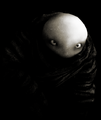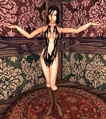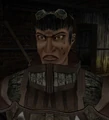Creation Myth
Bos Turokh
- Bos Turokh is a bull deity known as the 'World Bull', and the central figure in Steppe culture. He created the universe after consuming Suok, the personification of evil. He encompasses everything. His earthly manifestation is known as Bos Primigenius, which is the Latin name for the extinct species of cattle, the aurochs (described as a half-human, half-bull hybrid in the world of Pathologic). There are said to be very few auroch left in existence.[1]
- Bos (from Latin bōs: cow, ox) is the name of the genus of all types of cattle, and in Latin primigenius means firstborn.[2][3] Tur (тур) is the Russian word for an aurochs.[4]
Suok
| “ | "She made a body for herself out of bones and clay. She drank a soul for herself from the dark waters. She left her handprints on the walls. She filled the air with her spittle. She fed the spoilt blood to the earth."
from The Song of Suok's Consolation |
„ |
| — Pathologic Board Game[5] |
- Suok is a void of consuming darkness which Bos Turokh devoured, smothering Suok's progression with his body. It now resides within the World Bull, and is said to be the source all evil things. Unlike Boddho and Bos Turokh, it is never personified, and instead remains a concept of pure evil. Blood is sacrificed in the Circle of Blood to appease Suok.
- The real-world etymological basis of this word is unclear; it could be derived from the Russian word sukhoy (сухой), 'dry'.[4]
The Kin
The Bull Project
- The name of everything related to the Kin and the industrial aspect of the town—the train station, factories, and warehouses, as well as the Termitary and Abattoir. It can also refer to the town's meat-processing industry.
- All aspects of the Bull Project are owned by the Olgimsky family.
The Kin
- The Kin is an organization of Steppe natives and a cult that worships Bos Turokh. They believe bulls to be sacred. Once, they were a nomadic people that lived on the Steppe, but now most live in the Termitary and work for Big Vlad.
- They are the working class of the town, each caste performing their traditionally-given roles. Their labor supports the town economically.
Menkhu
- The menkhu—"Those Who Know The Lines"—are a special caste who are allowed to open bodies. While menkhu are notable in-game for their ability to dissect human bodies, their main purpose seems to be the dissection of bulls.
- The right to open bodies is passed down through family inheritance. Isidor Burakh is an esteemed menkhu, and he passes this knowledge to his son, Artemy.
Worms
- Humanoid creatures—"the Worms inside Boddho's body"—who work for the Kin. They are responsible for many tasks, such as the harvesting of herbs, creating medicines, and trading. Many worms live in yurts near the border of the Steppe.
- A worm that has the duty of herding cattle between the Steppe and the Abattoir is known as an odongh, translated in-game as "he who holds Him by the horns". The word odongh does not have a clear real-world origin, but may come from the name of a cryptid called the Mongolian Death Worm: olgoy-korkoy (олгой коркой), or 'intestine worm'.[6]
Herb Brides
- While implied to be the females of the Worm "species", they nonetheless appear fully human. They commune with the earth and dance to bring herbs to the surface.
- Traditionally, herb brides are only allowed to couple with odonghe, and can be bought and traded between them.
Butchers
- Workers of the Abattoir who are tasked with the the slaughter of bulls and the processing of their meat. Like the worms, their level of humanity is uncertain.
- While they are traditionally able to dissect bulls, they are still prevented from the dissection of human bodies. Traditionally, they are also the only ones permitted to dig in the earth (although Grace is allowed within the bounds of her duty as cemetery caretaker).[7]
Boddho and the Earth
Boddho
- A female personification of the Earth, styled as a mother. She is similar to Bos Turokh (as the progenitor of existence) and there is in-game debate over the creation myth. The land is her body and thus cannot be excavated or dug into.
- Boddho is said to have created all life and considers them all as her children.
- The origin of Boddho's name is unclear, but it may have been taken from 'cattle' in several steppe languages in the real world (bod in Mongolian), or from bod (бод), which means 'sting' or 'needle' in several Slavic languages.[6][8][9]
Children of Boddho
- While Boddho created all life, only Steppe natives and the "spirits conjured by the earth" are formally considered to be "Children of Boddho."
- They sacrifice blood to the ground to help Boddho thrive and grow, and believe in the preservation of the laws of nature.
Shabnak-Adyr
- An evil, feminine spirit said to be made of clay and bone. She devours people and spreads the Sand Plague. She is infamous among the townsfolk.
- Prior to the start of the game, Isidor Burakh is said to have seen her shortly before dying, and thus his and Simon Kain's deaths are initially blamed on her.
- The origin of the name Shabnak-adyr may be in shab (šab, шаб), which means 'night' in Persian and related languages, and ad (ад), which is Mongolian for 'demon' and Russian for 'hell'.[6][10]
Albino
- A strange being made out of clay. He considers himself to be Clara's brother and is an embodiment of the Sand Plague. He is hunted by Sticky.
- Being close to it appears to harm people, as The Bachelor had his face melting while talking to it in close proximity.
Rat Prophet
- A creature with the head of a rat and the body of a human that lives underneath the Theatre. He is able to see the future, but often tells lies. He visits Katerina at night and influences her prophecies. He also appears to have some knowledge regarding The Changeling.
Morality
Customs
- Neither the Earth nor the human body was made to be cut into. The Earth is sacred, so excavation too deep into the "earth's flesh" is a severe crime. As such, wells and organized digging are prohibited except by butchers.
- Only butchers may cut into cattle, and cutting into the body of a human is both a capital offense and a powerful taboo. While the menkhu are traditionally able to open human bodies, they are still regarded with some distaste.
The Law
- The natural "law" of the Earth. The Law is considered to be the will of Boddho herself; Steppe spirits are said to be created in order to fulfill it. The Changeling and her Bound all share a common goal in the preservation of the Law.
- Since the Polyhedron had to be planted so deeply in the ground, it is considered to defy the Earth and the will of Boddho, and the most prominent example of "the breaking of the Law."
Industrialization
- Although the Kin participates heavily in the meat industry of the Town, when the railroad was first built it was treated with great suspicion. Sometimes the rails were even sabotaged during their construction, or trains would just disappear. The Olgimskys and other leaders of the Town made no real attempt to do anything about this. Those from the Capital consider the rail that leads to the Town-on-Gorkhon to be cursed.[11]
Language
Alphabet
- The runes of the Steppe—the "long marks of Turokh"—could be considered the alphabet of the native people. They are more similar to "signs" than letters, with every mark having multiple meanings: each is "akin to a song" with layers of history attached to it.
- Cattle are ritually branded with the symbols, and the rune can correspond to both the owner or the age of the bull. Branding a bull is a stage in an intricate ritual that spans years. [12]
- Most of the meanings of these runes are unknown; the rune on the top left of the chart is taglur.[13]
Locations
- Egeh Gola: A rise near the cattle breeding camps, days away from the Town. Isidor Burakh often wandered near there. Egeh and gol mean, respectively, 'to return' and 'river' in Mongolian.[9]
- Golghoy Khen: The former name of Andrey Stamatin's pub -- now called Factus.
- Golgur: The name of the spring in the Stone Yard; Vlad the Younger notes that "[t]he etymology of the word is unclear, but it means something along the lines of "a smooth mouthful"".
- Gorkhon: The river whose tributaries divide the Town into three. The name bears some resemblance to the Russian word gor'kiy (горький), a word for 'wormwood', which is a bitter herb used to make absinthe, much as twyre is used for twyrine; in Mongolian, gorkhi (горхи) means brook.[9][4][6]
- Sugagh Khadugh: A spring on the boundary between the Steppe and the Rotten Field. Its water is considered sacred, but people still fear to drink from it because of the nearby burial mounds. Khad (хад) means 'crag' in Mongolian, and sug means 'water' in Tuvan (a Turkic language of Siberia).[9][14]
- Typkhe: The name of the spring in the Spin-a-Yarn Square; Vlad the Younger translates the name simply as "a well".
Other Terminology
- Bai Uraggha: An old man in folktales, said to have the head of a bull and cow's hooves instead of hands. His legs "stretched all across the earth, sinking into it like gigantic roots". He ate everything around him, turning the ground to desert. Then, starving, he died. This story purportedly explains the origin of the Gorkhon river, but its end, which might link it to said river, is not provided.
- Bos: An honorific title given to leaders. For example, Big Vlad is referred to as "Bos Vlad" by the Kin. Within the story, the title may be derived from the name of Bos Turokh. Bos (from Latin bōs: cow, ox, bull) is the name of the genus of all types of cattle.[3]
- En: A prefix; Maria calls Daniil en-Daniil at one point. It seems to be a term of respect or endearment.
- Holaeghe-ut golghoy ekh gerkhen syakhyl! Oluhn ekhe-barag!: An insult which an angry butcher addresses to the Bachelor.
- Mara: An evil spirit. In Germanic and Slavic folklore, a demon called the Mare, Mora, or Mara, would cause bad dreams by standing on a person's chest or strangling them.[15]
- Olon zuun jeley urda te'e hunde ubshen shulu'un de'egu'ur ebakha...: (In Cyrillic Олон зуун жэлэй урда тээ хундэ убшэн шулуун дээгуур эбаха…) A gatherer threatens Klara with this curse. It means something like "Many centuries ago the deadly stone plague… ”[6]
- Oynon: A title of respect used for doctors or scientists, meaning 'wise man'. The Burakhs, Daniil Dankovsky, and Stanislav Rubin are all referred to as oynon. In Mongolian, oi (ой) means 'mind'.[6][9]
- Souvilag'sh: "The one who teaches how to walk." Aspity tells Bachelor that this is her title in Pathologic: The Marble Nest.
- Taglur: Defined variously as "a circle" or "a kin circle". It also refers to a pagan game described as a "roundelay of sorts". Notably, Simon Kain had a chosen group of taglur--various people bound by fate--who then formed the Bound of the protagonists, and who were also referred to as Gobo's Taglur (Gobo being a character from an epic local to the Town-on Gorkhon). In German, the verb tagen means 'to convene' and the noun Tagung means 'conference'.[16]
- Tekhe: Something "like a soul, but smaller."
- Udurg: Literally "a body that contains a world". Protecting an unknown udurg was the goal of Isidor Burakh.
Twyrine & Herbs
“ Twyre is pain of the Steppe (‘huung twyrat ag agyl') „ — The Kin
Twyrine is a drink that has long been made out of the twyre of the Steppe. Although it has become fashionable outside of the Steppe, it is not possible to standardize recipes for the making of twyrine. Additionally, the recipes are closely guarded by the Kin.
Every root of twyre is different, and some may only be picked on certain days, months, or years. It is said that stalks of the herbs have name—these named ones are the most valuable. The people of the steppe believe that twyre feeds off the deeply-buried blood of the Earth and is proof of that area's pain. Some say it even brings the souls of the dead up from the Earth.[17]
Twyre is also called "oxitocia tvirinum", the first word of which is the Greek-derived medical term 'oxytocia' (rapid childbirth) which is related to the hormone oxytocin. The name of the herb may be taken from the Russian word tvorit', which means 'to create', and the related Ukrainian word tvaryna, which means 'animal' or 'livestock'.[4]
Gallery
Notes
- While largely fictionalized, the in-game language of the Kin seems to be built around real-world languages, including Russian and German, as well as Mongolic and Turkic languages.
References
- ↑ Steppe Lore and Culture
- ↑ primigenius - Wiktionary
- ↑ 3.0 3.1 Bos
- ↑ 4.0 4.1 4.2 4.3 Russian Academic Dictionary
- ↑ Pathologic Board Game (District 11: The Stains)
- ↑ 6.0 6.1 6.2 6.3 6.4 6.5 The steppe language of Pathologic: an etymological and grammatical glossary
- ↑ The right to dig
- ↑ List of Proto-Slavic verbs#Consonantic root
- ↑ 9.0 9.1 9.2 9.3 9.4 Bolor Dictionary
- ↑ شب - Wiktionary
- ↑ Geographical note
- ↑ The Steppe Alphabet (Kickstarter Update)
- ↑ Steam Community Market
- ↑ Tuvan Talking Dictionary - sug
- ↑ Mare (folklore)
- ↑ Tag - Wiktionary
- ↑ Of some peculiarities of the method of brewing twyrine
 Welcome to the new Dark Mode! If you'd like to browse in Light Mode, head over to your
Welcome to the new Dark Mode! If you'd like to browse in Light Mode, head over to your 























